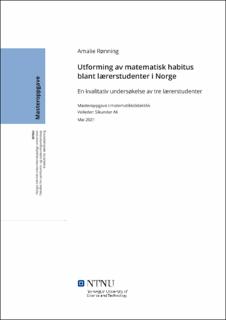Utforming av matematisk habitus blant lærerstudenter i Norge
Master thesis
Permanent lenke
https://hdl.handle.net/11250/2785137Utgivelsesdato
2021Metadata
Vis full innførselSamlinger
- Institutt for lærerutdanning [3542]
Sammendrag
Denne studien har undersøkt lærerstudenters matematiske habitus. Hensikten har vært å få innsikt i hvordan lærerstudentene har uttrykt sin matematiske habitus og hvordan lærerutdanningen har påvirket denne. Habitus er et relativt ukjent begrep i matematisk sammenheng i Norge, men det er blitt brukt i tidligere matematiske undersøkelser i andre land. Begrepet brukes om settet med disposisjoner som tillater individer å handle, tenke og orientere seg i den sosiale verden (Wedege, 2011). Hvordan lærerstudenter handler, tenker og orienterer seg vil derfor være viktig for deres praksis i matematikkundervisningen.
I denne oppgaven har jeg undersøkt problemstillingene: «Hvordan kommer matematisk habitus til uttrykk hos lærerstudenter?» og «Hvordan har lærerutdanningen som kontekst påvirkning på lærerstudenters habitus?». For å besvare problemstillingene har studien benyttet en kvalitativ metode, hvor det er intervjuet tre lærerstudenter som studerer matematikkdidaktikk ved NTNU. Datamaterialet ble analysert ved hjelp av en tematisk analyse, og tidligere forskning om habitus og lærerstudenter.
Resultatene i undersøkelsen viser at lærerstudentenes matematiske habitus er i konstant endring. Lærerstudentene uttrykker flere elementer som inngår i deres habitus, blant annet selvstendighet, trygghet og fleksibilitet. Studien setter lys på forholdet mellom agent og struktur, og det dialektiske forholdet som påvirker habitus. I analysen kommer det frem at lærerstudentene har blitt påvirket av forventningene og kravene de møter i lærerutdanningen. Samtidig finnes det antydninger til at lærerstudentene beholder en eksisterende habitus, basert på tidligere erfaringer. This study has examined the mathematical habitus of teacher students. The purpose has been to gain insight into how the teacher students have expressed their mathematical habitus and how the teacher education has affected this. Habitus is a relatively unknown term in a mathematical context in Norway, but it has been used in previous mathematical studies in other countries. The term is used about the set of dispositions that allow individuals to act, think and orient themselves in the social world (Wedege, 2011). How teacher students act, think and orient themselves will therefore be important for their practice in mathematics teaching.
In this thesis I have investigated the problems: "How is mathematical habitus expressed in teacher students?" and "How has the teacher education as a context affected teacher students' habitus?". To answer these questions, the study has used a qualitative method, where three teacher students who study mathematics didactics at NTNU have been interviewed. The data material was analysed using a thematic analysis, and previous research on habitus and teacher students.
The results of the study show that the teacher students' mathematical habitus is constantly changing. The teacher students express several elements that are part of their habitus, including confidence, security and flexibility. The study sheds light on the relationship between agent and structure, and the dialectical relationship that affects habitus. The analysis shows that teacher students have been influenced by the expectations and requirements they meet in teacher education. At the same time, there are indications that teacher students retain an existing habitus, based on previous experiences.
